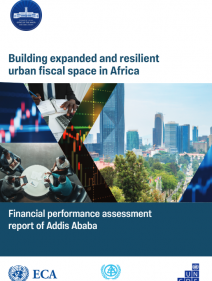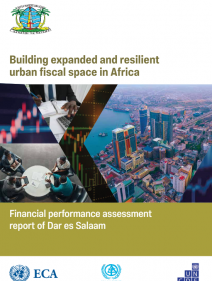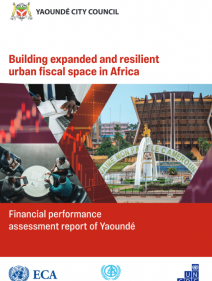Cities are widely recognized as engines of socioeconomic transformation, driving national development and fostering innovation. However, their ability to deliver essential services and infrastructure adequately largely depends on the strength and resilience of their municipal financial systems. The 15th tranche of the UN Development Account (DA-15) project on Expanding Municipal Finance in Africa seeks to enhance the institutional and technical capacities of cities to design and implement policy reforms and strategic interventions that expand and sustain local fiscal space.
The DA-15 Project: Strengthening Local Fiscal Systems
Urban areas across Africa are expanding at an unprecedented pace. While they hold immense potential to drive development, they also face mounting and overlapping challenges. Infrastructure demands are rising, service needs are growing, climate risks are intensifying, and global shocks continue to exacerbate existing vulnerabilities, while cities operate with limited fiscal space and restricted access to financial capital.
The United Nations Economic Commission for Africa (UNECA), in partnership with UN-Habitat and the United Nations Capital Development Fund (UNCDF), has launched the DA-15 project to address the growing challenges facing African cities by expanding and sustaining their fiscal capacity. Through data-driven assessments, capacity building, and technical support, the project supports cities in building resilient financial systems to meet growing urban demands and contribute to inclusive and sustainable local and national development. It is being implemented in six African cities: Addis Ababa, Dar es Salaam, Kigali, Lusaka, Nairobi, and Yaoundé.
This initiative also supports the implementation of Agenda 2063, the 2030 agenda on Sustainable Development Goals, and the Addis Ababa Action Agenda and Sevilla Commitment on Financing for Development.
Financial Performance Assessment
A central component of the project is a comprehensive financial performance assessment that examines the fiscal landscape of cities across key dimensions, including liquidity and solvency, fiscal autonomy, operating performance, revenue collection efficiency, asset management, and compliance with accounting and reporting standards. Beyond identifying strengths and gaps, the assessment outlines opportunities to expand and strengthen municipal financial systems to support long-term growth and stability. Grounded in local financial data and expert input, this data-driven evidence provides cities with timely insights to identify both opportunities and bottlenecks in local revenue and expenditure management, while also strengthening their capacity through targeted training and technical support. UNECA, in collaboration with UN-Habitat and UNCDF, led and supported the completion of financial performance assessment reports for Addis Ababa, Dar es Salaam, Kigali, Lusaka, Nairobi, and Yaoundé. The published reports are available under the Documents tab.
Methodology and Approach
A core principle of the project is to promote local ownership in its implementation, thereby ensuring long-term sustainability. With technical support from a UN team comprising experts from UNECA, UN-Habitat, and UNCDF, participating cities established technical working groups to lead and coordinate project implementation at the local levels. These groups are responsible for collecting, analyzing, and reporting financial data, as well as preparing city-specific action plans.
Specific elements of this approach include:
-
Building Trust: Secure stakeholder buy-in through continuous consultation and engagement.
-
Fostering Local Ownership: Establish local technical working groups and designate focal points.
-
Promoting Knowledge Sharing: Encourage peer learning and collaboration among cities and stakeholders.
-
Strengthening Local Capacity: Provide hands-on technical support and tailored training.
-
Data and Report Validation: Facilitate validation through workshops with senior officials and technical experts.
- Generating Data-Driven Evidence: Conduct financial performance diagnostics to inform planning and decision-making.




